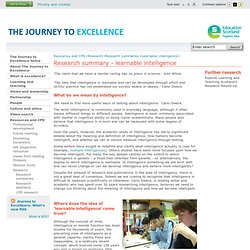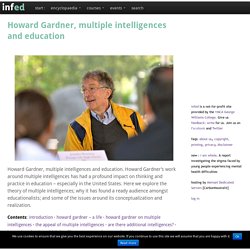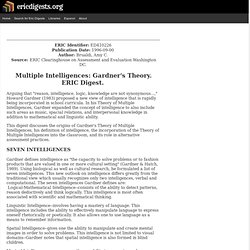

Artpdf58.pdf. Gifted%20and%20talented%20students%20a%20resource%20guide%20for%20teachers. Learnable intelligence - Research summaries. Although the concept of mind, intelligence or mental function has been studied for thousands of years, the prevailing view of intelligence as a general capacity, mainly fixed and measurable, is a relatively recent concept, which evolved some 150 years ago and is based on relatively little scientific research.

In the 19th century Frances Galton proposed the concept of a new kind of super facility, which he called 'General Ability of Intelligence' and he set up the world’s first mental test centre in London in 1882. He became obsessed by the idea of intelligence and assumed that heredity, not education, was the key factor in developing intelligence. Galton’s work set the scene for Binet, a French psychologist who invented the first intelligence test in 1904. Howard Gardner, multiple intelligences and education.
Howard Gardner, multiple intelligences and education.

Howard Gardner’s work around multiple intelligences has had a profound impact on thinking and practice in education – especially in the United States. Here we explore the theory of multiple intelligences; why it has found a ready audience amongst educationalists; and some of the issues around its conceptualization and realization. Contents: introduction · howard gardner – a life · howard gardner on multiple intelligences · the appeal of multiple intelligences · are there additional intelligences?
· howard gardner’s multiple intelligences – some issues and problems · conclusion · further reading and references · how to cite this article I want my children to understand the world, but not just because the world is fascinating and the human mind is curious. Multiple. ERIC Identifier: ED410226 Publication Date: 1996-09-00 Author: Brualdi, Amy C.

Source: ERIC Clearinghouse on Assessment and Evaluation Washington DC. Arguing that "reason, intelligence, logic, knowledge are not synonymous... ," Howard Gardner (1983) proposed a new view of intelligence that is rapidly being incorporated in school curricula. In his Theory of Multiple Intelligences, Gardner expanded the concept of intelligence to also include such areas as music, spacial relations, and interpersonal knowledge in addition to mathematical and linguistic ability. This digest discusses the origins of Gardner's Theory of Multiple Intelligences, his definition of intelligence, the incorporation of the Theory of Multiple Intelligences into the classroom, and its role in alternative assessment practices.